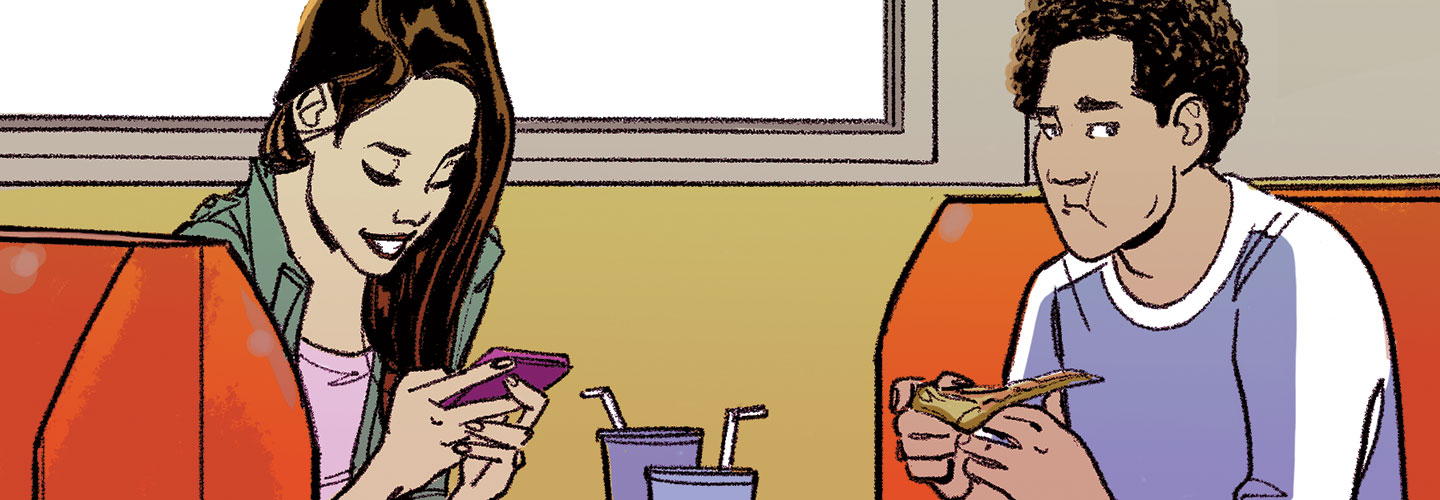When you think about “etiquette,” you might picture something like the rigid rules at a society ball in the privileged world of Gossip Girl. But etiquette isn’t about snootiness—manners are for anytime, any day, and they're meant to put everyone (yourself included!) at ease. “Treating people with kindness and respect is the best thing you can do for yourself,” says Alex J. Packer, a psychologist and author of How Rude! The Teen Guide to Good Manners, Proper Behavior, and Not Grossing People Out. Think about it: If you know how to comport yourself in different situations, you won’t feel awkward or stressed out. Here, we’ll skip the cotillion-esque stuff about posture and grooming and focus on a few situations that’ll get you thinking about courtesy—so when you're faced with a social quagmire, you’ll know the most polite way to handle it. Ready? Let’s go.

The Modern Manners Survival Guide
Is it rude to shush someone at a concert? Is it OK to check your phone on a date? We’ve got answers to your most pressing etiquette questions.
ARE YOU A MANNERS MASTER?
How would you react in these etiquette dilemmas? Learn what’s the most polite course of action—and why.
The people in front of you are chatting so loudly, you can’t hear the band. You:
A. Steam resentfully in silence.
B. Say, “Can you please stop talking? It’s rude and distracting.”
C. Get their attention and say, “Hey, I'm having a hard time hearing the show . . .”
Correct answer: C. “Your odds of success are highest if you aren't accusatory,” says Packer. Sure, they may be inconsiderate, but you’ll do best by assuming they have no idea they’re being annoying. Say: “Hey, hopefully we can all enjoy the show, but I have a hard time hearing. If you could turn it down a half-notch, I'd really appreciate it.” Even if you only get a blank stare back, say thanks. “Asking for help is better than finger-pointing,” says Myka Meier, founder of Beaumont Etiquette in New York City.
Your parents are excitedly watching you unwrap your present and . . . epic fail, this game won’t even work on your PlayStation 4. You:
A. Roll your eyes and tell your parents they should have known better. (The system is right there in the living room!)
B. Show them the box and explain where it says what game system it’s for, so they’ll know better next time.
C. Smile and say thank you.
Correct answer: C. “It’s always important to show your gratitude,” explains Meier. “They went to the trouble of buying you something they thought you’d love, and they’re excited to see your reaction, so in that moment, hide your disappointment and say thank you.” Give it a day or two, and then politely mention the mixup. Packer suggests trying something like this: “Hey, Mom and Dad, I'm excited to have a new game and I would love to try this out, but I think it actually won’t work with my system. When you have time, do you think we could go to the store together and exchange it?”
You’re doing your best to ignore it, but there are so many texts in a row—it might be important! You:
A. Say “excuse me!” and pull out your phone to check.
B. Nod and pretend to keep listening while you surreptitiously peek at your phone below the table.
C. Do nothing—it’s never polite to prioritize your phone over the person you’re with IRL.
Correct answer: A. It’s not ideal, but if your phone is blowing up and you can’t concentrate, wait for a pause and ask for permission: “Please forgive me, but I’ve been getting text after text and I just want to check that everything’s OK.” Then glance down and—assuming all’s well—turn it to airplane mode or Do Not Disturb. (This is not your excuse to open up Snapchat!) You can defuse the rudeness by giving a heads-up that you might be interrupted: “My mom’s going to call to let me know if I’m staying with her or my dad this weekend, so I’ll have to quickly take that.” Bottom line: You’re on a date with your date, not your phone!
Your teacher says something nice about the essay you turned in last week. As he goes on about your topic and the great writing, you realize—oh, no!—he’s remembering wrong. That’s someone else’s paper he’s talking about. You:
A. Just say thank you and change the subject, since you don’t want to embarrass him.
B. Wait until he’s finished and let him know that paper (sadly!) isn’t yours.
C. Cut him off mid-sentence with, “Mr. G., you’re remembering wrong.”
Correct answer: B. Taking credit for someone’s work isn’t cool, and interrupting and making your teacher feel like a fool won’t win you any points. “You’ll impress your teacher with your honesty, and no one will feel bad if you use a little humor,” says Packer. Try something like, “That paper sounds epic—I wish I’d written it! Hopefully, you’ll find mine equally magnificent.”